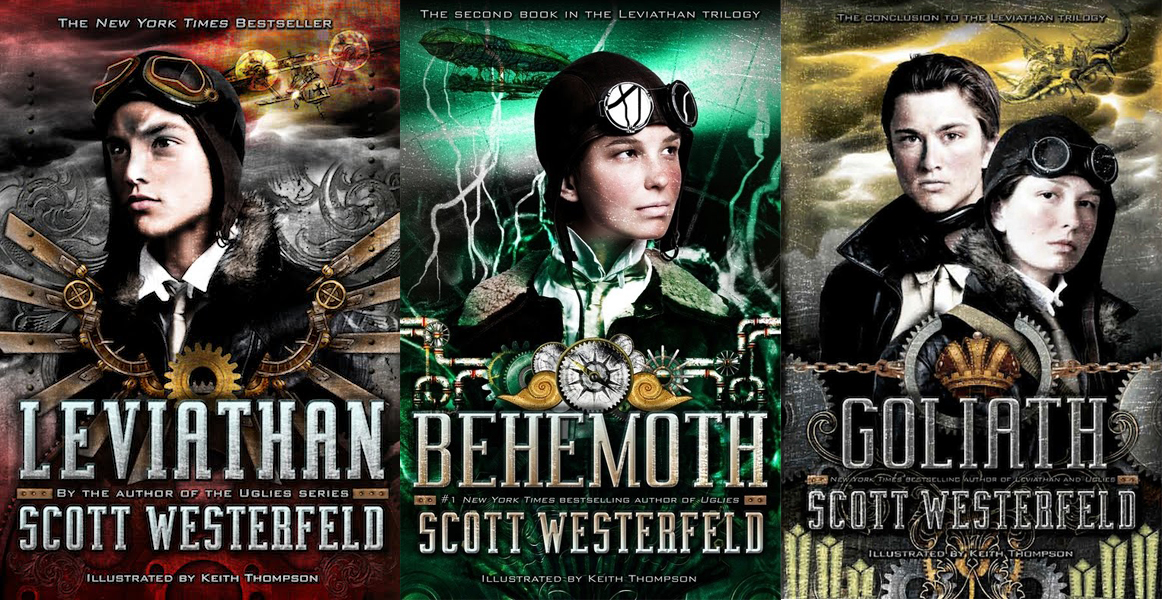Leviathan trilogy

Fabricated species, steam-powered mechanical machines, speculative World War I history, and an epic adventure story on-board a flying whale running on hydrogen. If the steampunk theme had not already grabbed me from the get-go, World War I and the term “Darwinist” would have. As such once I started reading Leviathan by Scott Westerfeld, I was thrown completely into the Clanker versus Darwinist world. By the end of the trilogy, I was fangirling like a love-struck teenager.
The Leviathan trilogy tells the story of two rather delightful characters: His Serene Highness Prince Aleksandar of Hohenberg, heir to the empire of Austria-Hungary; and Deryn Sharp, a common British girl with a noble, boyish heart.
Alek is the only son of Archduke Franz Ferdinand, and for those of you who know a bit about the beginnings of World War I, you’ll know that this doesn’t spell well for the poor prince. Orphaned at the beginning of Leviathan, Alek is whisked away from Austria-Hungary, in the attempt to keep him away from the Germans. Coupled with a team of engineers, mechanics, and a stalwart soldier of the Habsburg royal family, Alek manages to escape from his empire in the dead of night. Survival is key for Alek, who holds the very secret of his Habsburg inheritance.
Deryn Sharp is unsatisfied with her family’s expectations over becoming a proper British lady. Her love is the air, and like her brother, she wishes nothing more than to serve under the British Air Force. The problem, however, is that she’s a girl. And girls aren’t allowed anywhere near the British army. But this does not stop Deryn, who hides her gender and poses as Dylan Sharp, a promising recruit to the British Air Force. Whisked away onto the Leviathan on an accidental Huxley flight, she is put to work as a crewman, to her great delight.
The two characters collide on this monstrous ship, a “fabricated” species of flying whale and the pride of the British Air Force; Alek, as the tentative Clanker prisoner, and Deryn, as the lowly recruit and assistant to a most interesting female zoologist. The backdrop is, of course, the quick progression of the First World War. And with two sets of warring superpowers (the Clankers and the Darwinists), the adventure could only intensify from there.
Westerfeld pulled so many ideas in various places for Leviathan, and it was a great deal of fun being able to spot the real, historical importance of names and events. I also extremely liked the constant switch-a-roo of viewpoints. I know I usually whine about this in certain books, but it actually works here!
Behemoth went even further, and I have to say, this was probably my favorite of the three books. The second book continued in Istanbul, with a great degree of Clankers and the most amazing showcase of animals and cultural symbols all created with the minds of steampunk engineers. But it's definitely Goliath that gave the trilogy its explosive finish, wrapping all of the plotlines in a neat little bow and handing it to the stunned audience.
There were so many elements that I could further discuss to show how much I loved the trilogy. The new and old characters were a joy to read, and the historical figures thrown into the mix were absolutely fantastic. Barlow, Tesla (my favorite mad scientist), Hearst, and sensational-but-rather-absent Pulitzer must have been my favorite historical mentions. Of course, Count Volger remains to be my favorite secondary character (though I can’t help this, I developed a fond weakness for the Clankers).
To top it off, the trilogy had amazing artwork included by Keith Thompson. His images of stormwalkers and fabrications added to the magic of the story. Imagine my delight when at the next turn of the pages, I could actually see the envisioning of the Huxley, the kraken, the Habsburg stormwalker, and the Tesla cannon, among other contraptions and beasties?
I loved the journey, the battles, and the pains and joys the story underwent. I loved the machines, the faux sciences, the Darwinists, the Clankers, the flechette bats, the perspicacious lorises, the stormwalkers, and the marriage of the two conflicting ideas. I loved the culture shock within Britain, Germany, Istanbul, Russia, and Austria-Hungary; and enjoyed the journey across Siberia, to Japan, and even to Mexico and the United States.
So thank you, Westerfeld, for a trilogy that has not lost its magic from beginning to end.




